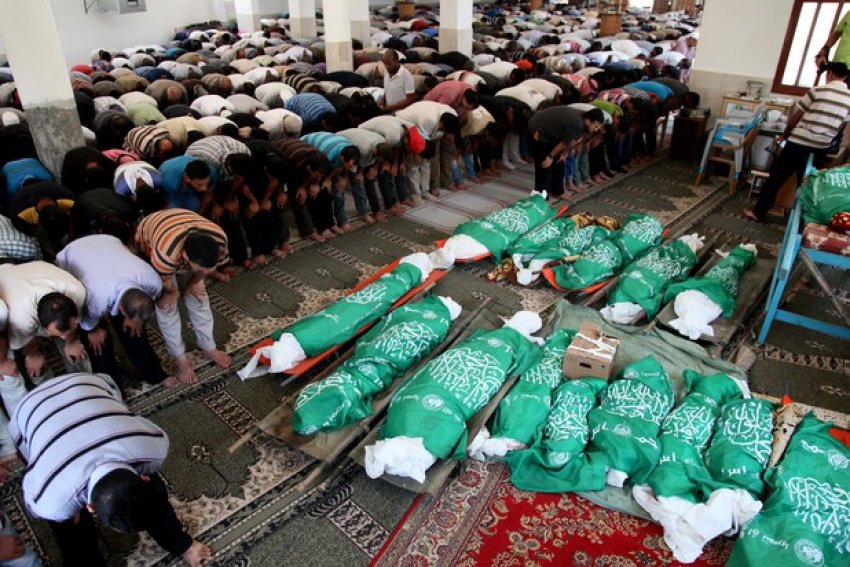
If military victory and strength are measured by the number of civilians, especially children, that an army can deliberately target and slaughter with sophisticated machines, then there is no doubt that Israel is winning in Gaza — and has always been the winner in Palestine.
But even though it is still mercilessly killing civilians in Gaza as I write these words on July 22, Israel has, in political and strategic terms, already lost the “war” it launched on Gaza on the false pretext of stopping rockets.
As I’ve argued repeatedly, and as the facts show, the easy and time-tested way for Israel not to receive rockets from Gaza is not to attack Palestinians in Gaza.
Israel’s defeat in Gaza will be as significant as its defeat in Lebanon in 2006 (where it also “won” in terms of murdering civilians: 1200 in total, a third of them children).
Lebanon off limits
For decades, when Israeli leaders needed to court popularity or create a distraction, they attacked or invaded Lebanon, slaughtering Palestinian and Lebanese civilians with total impunity.
Due to fierce resistance that Israel did not expect, the Israeli army lost 121 soldiers during its 34-day invasion of Lebanon in the summer of 2006.
Since that painful lesson, even an Israeli prime minister as foolish as Benjamin Netanyahu would not be eager to repeat the experience of his predecessor Ehud Olmert.
With Lebanon off limits, Gaza became Israel’s convenient outlegazat for its bloodlust, with repeated massacres in 2006 (during the Lebanon war!), in December 2008-January 2009, in November 2012 and now.
All these massacres have been committed against a population held in an open-air prison, virtually cut off from the outside world.
Israel found it could bomb Gaza from the air and, yes, even though the resistance could fire rockets back, these amounted to pinpricks.
Only when large barrages are being fired in the context of Israel’s present huge assault do rockets from Gaza cause more damage, but very little of this is physical: it is economic and psychological.
With the present massacre, too, Israel insisted on needless bloodshed when it could have had “security” by sticking to the November 2012 ceasefire agreement it signed, which includes the requirement to lift the siege.
Gaza fights back
Israel’s great “deterrent” threat was always the ground invasion of Gaza. A deterrent is often more effective as a threat than as a reality. If it is used and proves to be a bluff, it no longer works.
Now Israel has gone into Gaza, and Israelis are shocked at the extent of the losses they are suffering.
Israel has so far admitted to 25 dead soldiers in just four days of ground operations. That’s a higher daily casualty rate than it suffered in Lebanon.
Had Netanyahu known that would be the price, he would not likely have launched this foolish and criminal slaughter in Gaza.
Al-Qassam, the military wing of Hamas, has proven to be capable, tenacious and ingenious, engaging Israelis in fierce combat inside Gaza and taking the fight to Israeli territory.
But don’t take my word for it. Israeli officers are saying it themselves, as Anshel Pfeffer reported for Haaretz on July 21: “One officer, a veteran of Gaza operations, who left the fighting area for a few hours, told Haaretz: 'I’ve been to Shujaiyeh before, but I’ve never seen it — or Hamas — like this before.
“'Their equipment and tactics are just like Hezbollah. Missile traps and IEDs everywhere — and they stay and fight instead of melting away like in the past.'”
They stay and fight because, unlike Israel, Palestinians in Gaza have no choice, no alternative, no option to go back to a slow death under a crippling siege.
Why no ceasefire?
Now the question is: why hasn’t there been a ceasefire yet? On July 21, after the UN Security Council met, US ambassador to the United Nations Samantha Power tweeted: “Just got out of UNSC session on Gaza. To end the violence we need a ceasefire w/o preconditions. Urge countries to support Egypt's proposal.
“#Gaza ceasefire would let us address urgent humanitarian needs & underlying issues. Must work to get off this dangerous path & restore calm.”
Let’s be clear: the Palestinian demand to end the siege is not a “precondition” and it is not a political demand. It is a basic humanitarian right.
The problem for Israel, the US and their Arab allies, especially the Sisi dictatorship in Egypt, is this: they know that this “war” is not going to get better for Israel the longer it goes on. But they do not want to give the Palestinian resistance a victory.
So now Power, on behalf of the United States and Israel, is re-framing the most basic humanitarian rights as negotiable and unreasonable “preconditions”. By doing so she is assisting Israel’s incremental genocide in Gaza.
Palestinians still have and must rely on alternatives to awaiting the mercy of the likes of Samantha Power and her boss, US President Barack Obama.
Palestinians are resisting tenaciously on the ground, as is their right. Globally, a growing movement understands that Israel will continue to commit its massacres with impunity until we stop it.
The price, in innocent human life, of our failure to stop Israel’s repeated pogroms so far is enormous and catastrophic. As I wrote after the 2008-2009 massacre, Israel can never bomb its way to legitimacy. But its bombs still kill.
We owe it to all those whose lives Israel has stolen not to let them down. Arms embargo now!
[Reprinted from Electronic Intifada. Ali Abunimah is a co-founder of Electronic Intifada and author of 2007's One Country: A Bold Proposal to End the Israeli-Palestinian Impasse.]